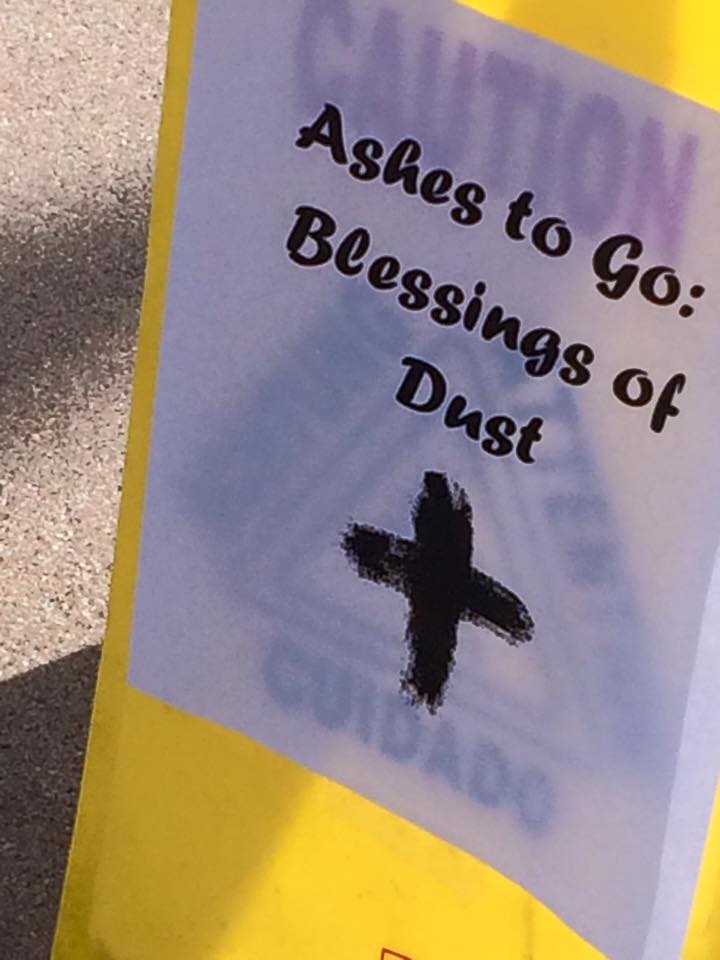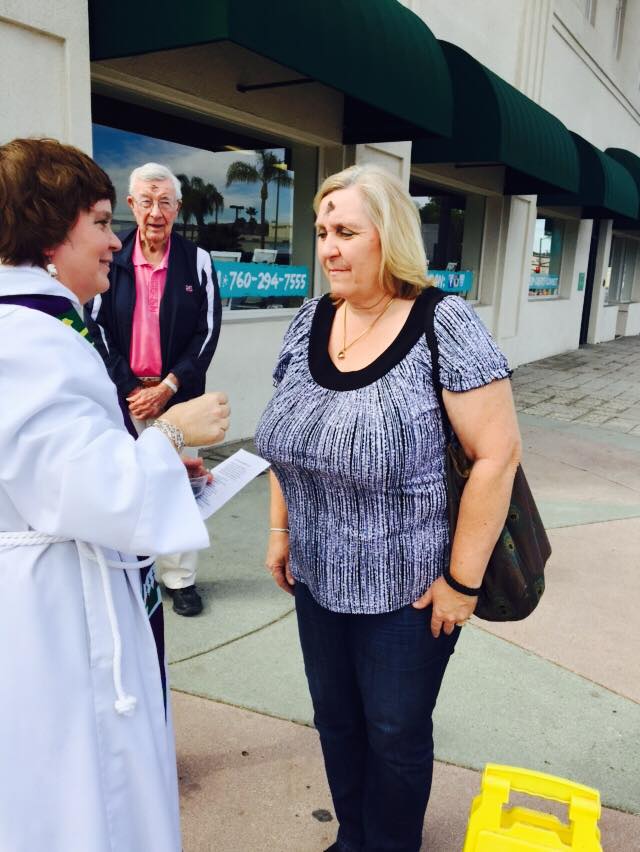“Unfortunately, ashes don’t mean much if it doesn’t kick off some working on being a better person.”

Ashes to Go, Escondido
As I worked to collect partners for our Ashes to Go program downtown, one clergyperson sent objections. I completely understand.
Don’t we all? We hesitate to give money to homeless guy by the freeway entrance—is he going to buy food or booze? We are skeptical, and rightly so. I have to say that I have been taken many times—by parents promising to bring their children regularly to church if only I sign the paperwork saying they are members so they can get the discount at the local Christian school; the young couple who will definitely come to church after I do the wedding, the person in the hospital swearing to be faithful if only he is healed. None of these people ever showed up at Trinity, and I could tell lots more stories with the same ending. They’ll jump through my hoops to get the baptism or the wedding or the assistance, but they’re making those promises with fingers crossed.
Jesus had the same problem. The Gospels record crowds following him in hopes of the spectacle of free food or healing, but not so interested in the lifestyle he was calling them to share. This may be why he tried so hard to keep his miracles secret. They used him for what they could get, when he offered so much more.
German theologian Dietrich Bonhoeffer worried about what he called “cheap grace,” which he described as
“the grace we bestow on ourselves. Cheap grace is the preaching of forgiveness without requiring repentance, baptism without church discipline, Communion without confession… Cheap grace is grace without discipleship, grace without the cross, grace without Jesus Christ, living and incarnate.”
Bonhoeffer, killed by the Nazis in 1945 because of his resistance, knew something about the cost of following Christ. He also knew, as he watched German clergy and churches embrace the Nazi agenda, about those who claimed the name Christian without paying that price. Less dramatically, we can identify easily persons who claim to follow Jesus, and yet show nothing of the compassion, humility, and self-sacrifice that define Jesus’ way. We call them hypocrites. Even less dramatic are the persons of good intent promising to come to church, pray, and give, but then finding more important things to do on Sunday mornings, once the crisis is past or need met. Hypocrites! Maybe we should withhold ashes until they really mean it.
Grace is free. Does that make it cheap?
We live in a culture of endless competition. Nothing is free, unless it’s a scam. Even parents are advised to charge their underage children rent, teaching them to be responsible and know that nothing, not even love, is free. In response, we live threatened by the anger of those who haven’t gotten the rewards they believe they deserve, the anxiety of those who feel they don’t measure up, and the distrust of pretty much everyone. Putting a price on it all is certainly working!

The church has a different message: God’s love is here for you, whether or not you notice or care, not because you deserve it, but because God loves. Cutting through the anxiety and anger, Jesus offers us this free gift. We are invited to build our lives on God’s vision of us, and not our own. This foundational gift is grace, but it’s not cheap because it is meant to be life-changing. We know the price Jesus paid to demonstrate his message, and he calls us to follow.
Jesus did not hand out cheap grace. I wish it were otherwise, but Jesus never has a good word to say about hypocrites. He was not ok with being a second priority, telling his followers that anyone who put the demands of family life above him was not worthy of his call. He offered new life, and expected that a new way of life would be the response. He frequently describes what his disciples will be like—loving, generous, committed—half-hearted is never included.
But he did hand out grace. He opened the door, offered the invitation, and let people choose to walk through. People turn away from his path. That does not surprise or distress him. He continues to preach and walk the way of the cross. For every rich young man who can’t let go of his well-ordered life there’s a Peter or Mary Magdalene or healed blind man doing their best to follow.
So the story goes even today. For every broken promise, there’s a life put on track by the Gospel. I could tell stories of faith kept—of the man who showed up drunk and destructive at Trinity coming to worship months later, sober and working his steps. I remember the family who came to church for baptism, and stayed as the children grew up, left the house and beyond. There’s the guy who came to church for years only on Christmas, until he needed something more, and now is here weekly. I could go on.
The point is—grace is unpredictable. We present the message of love and inclusion that is the Gospel, scattering the message like seeds. You never know what might take root.
What about the hypocrites? Ashes for them?
I will be offering ashes downtown this year. No sermon, no service—just a short blessing and a symbolic act. What happens next, I don’t know. It is highly likely that those who receive the ashes and do not go to church will continue to sleep in on Sunday no matter what they tell me.
And yet that outcome is not determined. The invitation has been given. That’s all we can do—give the message of life and love, but with no control over what happens next. Words of repentance have been spoken. Who knows where or how they might land?
Ashes to Go will be Wednesday, February 26, noon-1:00pm in downtown Escondido, on the corners of Broadway and Grand. Tell your friends.
